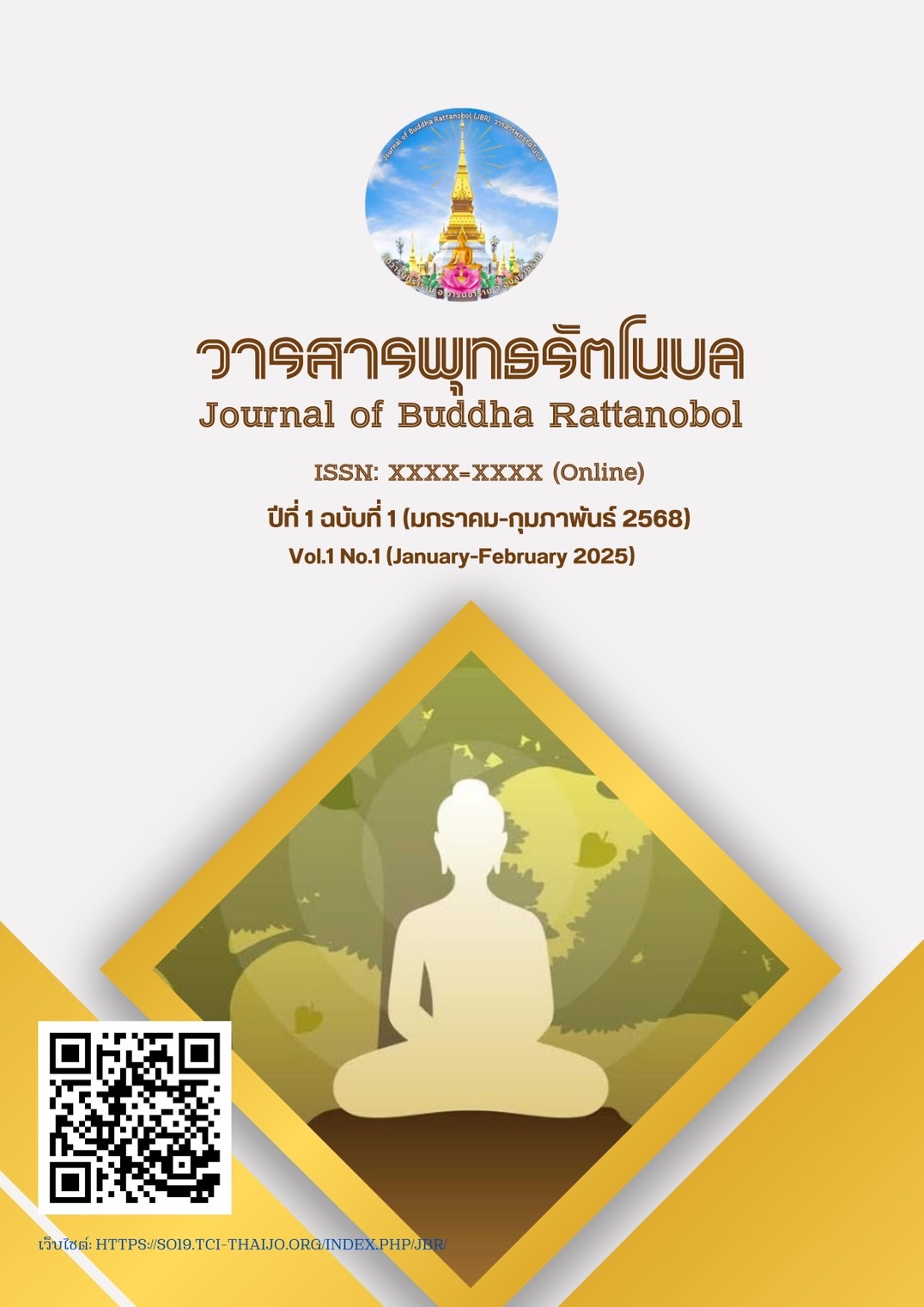The Development of Student Ethics Based on the Principle of Karavah 6
Main Article Content
Abstract
This article focuses on studying the development of students' ethics according to the principle of Karavah 6, an essential Buddhist teaching related to showing respect and fostering good relationships in society. Karavah 6 consists of respect for the Triple Gem, parents, teachers, authority figures, virtuous individuals, and nature. The application of these principles in the education system helps instill good behavior and moral values in students, fostering respect for their own rights and responsibilities, as well as those of others. In today's context, ethical issues among students have become a challenge in education. The lack of respect for authority figures and teachers creates conflicts and reduces the effectiveness of learning. Karavah 6 serves as an effective tool for building discipline and responsibility in students, while also enhancing a respectful and harmonious learning environment among students, teachers, and the community. This study reveals that integrating the principle of Karavah 6 into the teaching process and daily life of students significantly improves the quality of education and student behavior. Promoting respect and responsibility towards their duties and the community helps foster a peaceful and progressive society in the long term
Article Details

This work is licensed under a Creative Commons Attribution-NonCommercial-NoDerivatives 4.0 International License.
References
เกรียงศักดิ์ เจริญวงศ์ศักดิ์. (2546). การคิดเชิงวิเคราะห์ (พิมพ์ครั้งที่ 3). กรุงเทพมหานคร: ซัคเซสมีเดีย, หน้า 4-8.
จำนงค์ ทองประเสริฐ. (2552). จริยศาสตร์และจริยธรรมเพื่อพัฒนาชีวิตและสังคม. กรุงเทพมหานคร: โรงพิมพ์มหาจุฬาลงกรณราชวิทยาลัย, หน้า 1.
ดวงเดือน พันธุมนาวิน. (2524). จิตวิทยาจริยธรรมและจิตวิทยาภาษา. กรุงเทพมหานคร: สำนักพิมพ์ไทยวัฒนาพานิช, หน้า 2.
ทิศนา แขมมณี. (2526). การแก้ปัญหาและพัฒนาตนเองด้วยระบบคู่สัญญา. วารสารวิชาการ, ปีที่ 10 ฉบับที่ 5 (เมษายน-มิถุนายน 2526): 15.
พระธรรมปิฎก (ป.อ. ปยุตฺโต). (2529). คุณธรรมและจริยธรรมสำหรับเด็กและเยาวชนรุ่นใหม่. กรุงเทพมหานคร: จุฬาลงกรณ์มหาวิทยาลัย, หน้า 118.
พระธรรมปิฎก (ป.อ. ปยุตฺโต). (2545). พุทธธรรม ฉบับเดิม (พิมพ์ครั้งที่ 1). กรุงเทพมหานคร: สำนักพิมพ์ธรรมสภา, หน้า 168.
พระเทพเวที (ประยุตฺ ปยุตฺโต). (2530). แนวทางการพัฒนาจริยธรรมไทย. กรุงเทพมหานคร: มหาจุฬาลงกรณราชวิทยาลัย, หน้า 56.
พระมหาภิรัฐกร อำสุมาลี. (2564). แนวทางการปฏิบัติสู่ความเป็นอริยะที่ปรากฏในภยสูตร. วารสารโพธิศาสตร์ปริทรรศน์.
พระเมธีธรรมาภรณ์ (ประยูร ธมฺมจิตฺโต). (2533). พุทธศาสนากับปรัชญา. กรุงเทพมหานคร: อมรินทร์ พริ้นติ้งกรุ๊ฟ, หน้า 81.
เพ็ญศิริ จีระเดซากุล. (2539). กระบวนทัศน์ของการพัฒนาและการศึกษาวังวนของวิกฤตทางจริยธรรมในสังคมไทย. กรุงเทพมหานคร: มหาวิทยาลัยศรีนครินทรวิโรตประสานมิตร, หน้า 41.
บุญมา จิตจรัส. (2533). มงคล 38 ประการ ฝ่ายวิชาการ กองศาสนศึกษา กรมศาสนา. กรุงเทพมหานคร: คลังวิทยา, หน้า 215.
ราชบัณฑิตยสถาน. (2542). พจนานุกรมฉบับราชบัณฑิตยสถาน. กรุงเทพมหานคร: นานมีบุ๊คส์พับลิเคชัน, หน้า 323.
ศรีชล ฉายาพงษ์. (2553). ศึกษาความต้องการพัฒนาตนเองของข้าราชการตำรวจ ชั้นสัญญาบัตรและชั้นประทวน. วิทยานิพนธ์รัฐศาสตรมหาบัณฑิต, มหาวิทยาลัยบูรพา, หน้า 10.
ศักดิ์ชัย นิรัญทวี. (2525). จริยศาสตร์ศึกษา. กรุงเทพมหานคร: โอเดียนสโตร์, หน้า 96.
ศิริวรรณ เสรีรัตน์, สมชาย หิรัญกิตติ, และธนวรรธ ตั้งสินทรัพย์ศิริ. (2550). การจัดการและพฤติกรรมองค์การ. กรุงเทพมหานคร: ธีระฟิล์มและไซเท็กซ์, หน้า 168.
สาโรช บัวศรี. (2521). ความรู้สำหรับครูเรื่องบูรณาการ. กรุงเทพมหานคร: รุ่งเรืองสาสน์การพิมพ์, หน้า 3.
สุรชัย จันทรจรัส. (2561). การประยุกต์เศรษฐกิจพอเพียงในระบบการศึกษา. วารสารการศึกษาพัฒนาชุมชน.Alderfer, C. P. (1972). Existence, Relatedness, and Growth: Human Needs in Organizational Settings. New York: Free Press, p. 45.
Herzberg, F. (1959). The Motivation to Work. New York: John Wiley & Sons, p. 113.
Kant, I. (1785). Groundwork of the Metaphysic of Morals. Cambridge: Cambridge University Press.
Kohlberg, L. (1976). The Philosophy of Moral Development: Moral Stages and the Idea of Justice. Harper & Row.
Maslow, A. H. (1943). A theory of human motivation. Psychological Review, 50(4), 370-396.
Maslow, A. (1970). Motivation and Personality. New York: Harper & Row, หน้า 80-81.
Maslow, A. H. (1972). Motivation and Personality (2nd ed.). New York: Harper & Row, p. 12.
McGregor, D. (2021). Theory X and Theory Y of Motivation.
Papattha, C. (2021). Causal Relationship Model of the Ethical Factors Influencing Ethical Characteristics of Mass Communication Students Based on Thai Qualifications Framework for Higher Education. Journal of MCU Buddhist Review. Download PDF.
Piaget, J. (1932). The Moral Judgment of the Child. London: Kegan Paul, Trench, Trubner & Co., Ltd.
Soros, G. (2016). Economic Needs and Global Growth. Journal of International Economics, 12(2), 55-67. Available at: International Economics Journal.
Udomchandavan, P. (2018). Human Needs and Community Development in Thailand. Mahachula Academic Journal, 103-115. Available at: Mahachula Journal.


